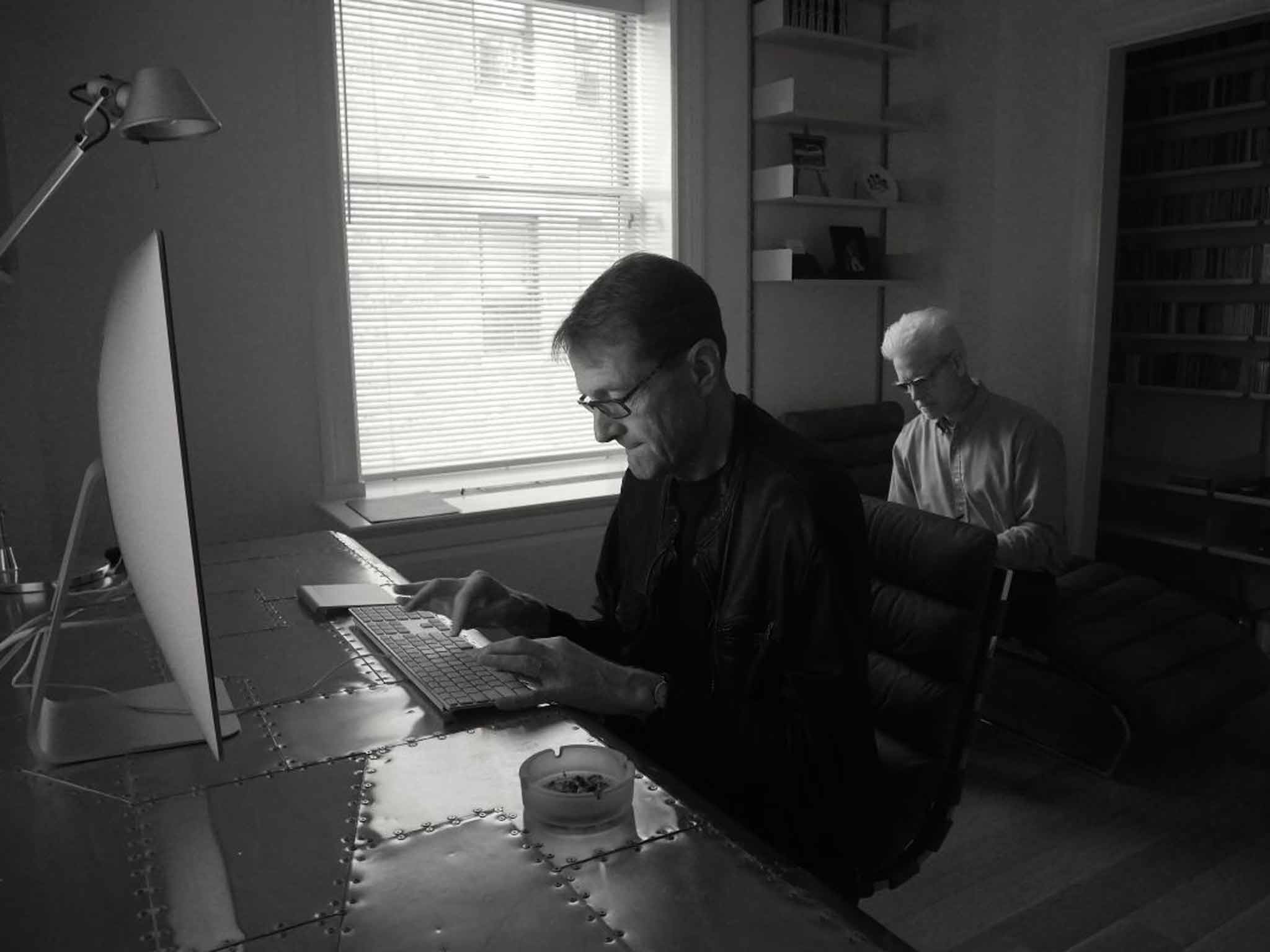Lee Child on Jack Reacher: How the best-selling author writes his mysteries
Every 1 September, Lee Child begins work on another of his massively popular Jack Reacher novels. Only this time, he had Andy Martin looking over his shoulder - who discovered that the author regards his books as more Proust than potboiler

Your support helps us to tell the story
From reproductive rights to climate change to Big Tech, The Independent is on the ground when the story is developing. Whether it's investigating the financials of Elon Musk's pro-Trump PAC or producing our latest documentary, 'The A Word', which shines a light on the American women fighting for reproductive rights, we know how important it is to parse out the facts from the messaging.
At such a critical moment in US history, we need reporters on the ground. Your donation allows us to keep sending journalists to speak to both sides of the story.
The Independent is trusted by Americans across the entire political spectrum. And unlike many other quality news outlets, we choose not to lock Americans out of our reporting and analysis with paywalls. We believe quality journalism should be available to everyone, paid for by those who can afford it.
Your support makes all the difference."This isn’t the first draft, you know." He’d only written two words. "CHAPTER ONE."
"Oh," I said. "What is it then?"
"It’s the only draft!"
Right then, he sounded more like Jack Reacher than Lee Child. More Reacher than writer. "I don’t want to improve it. When I’ve written something, that is the way it has to stay. It’s like one of those old photos you come across. From the 1970s. And you have this terrible Seventies haircut and giant lapels on your jacket. It’s ridiculous – but it’s there. It is what it is. Leave it alone."
We were in the back office of his apartment on Central Park West, New York, a few blocks north of where John Lennon used to live. Lee Child was sitting at his huge riveted metal desk, his long fingers poised over the keyboard, gazing into a 27in screen. Which was practically blank. It was 2.26 in the afternoon, 1 September 2014.
He had to start on 1 September – 20 years to the day since, having been fired from his job in television, he went out and bought the paper and pencil (and a pencil sharpener) with which he would write Killing Floor, his first Jack Reacher novel. Every year, ever since then, he has started a new one on the very same day. It’s a ritual with him. Now, it’s Reacher 20.
"The first day is always the best," Child, now 60, said. "Because you haven’t screwed anything up yet. It’s a gorgeous feeling." I was about to be witness to the genesis of a new work, the Big Bang moment. I had no idea what was coming next. Nor did he.
Because this is the key thing about the way that Lee Child writes, the thing that drew me to write to him and ask whether he would mind my watching him at work. He really didn’t know what was going to happen next. He had nothing planned. "I have no title and no plot," he said. But I could come anyway. He didn’t think I would put him off too much. He relied on inspiration to guide him. Like a muse. Something very basic and mythical, without too much forethought. He likes his writing to be organic and spontaneous and authentic. But he had a glimmering of what was coming. "I can feel it. The rhythm. It’s got to be stumbly. It’s tough guys talking. I have to get their vernacular. But, at the same time, it has to trip ahead. A tripping rhythm. Forward momentum."
I was sitting on a kind of sofa a couple of yards behind him. Just perched on the edge of it, not really lying down or anything.
"It’s reverse Freudian," Child said. "You’re on the couch and you’re analysing me."
The title had popped into his head the night before. "Make Me… I don’t know, it’s not definite. But I like it. It’s got something. Sounds like Reacher, all right. Playground machismo. And then there’s that meaning to do with being under surveillance, making someone, identifying them, tailing them. And maybe a little bit erotic or romantic, too."
I could see over his shoulder. "And remember, I’m not making this up. Reacher is real. He exists. This is what he is up to, right now. That’s why I can’t change anything – this is just the way it is."
He lit another cigarette and took a deep drag and blew out a lot of smoke, then put the cigarette in the ashtray. "I was thinking: you have a high risk of dying from secondary smoke inhalation here."
I was thinking: the smoke is all part of it. Like a magic show. Smoke and mirrors. Lee Child was a magician, for once tweaking aside the curtain and saying: "OK, come on through and let me show you exactly how it’s done." Revealing his secrets.
He tapped a few keys. "Do not check spelling. Or grammar. I am going to let Microsoft tell me what grammar is?!"
Anyone who doesn’t want to know how the next Reacher book begins, look away now. The first line came out as follows:
"Moving a guy as big as Keever wasn’t easy."
I was hooked. He had me on "Moving". Participle form, verb of action. We begin with a burial. The novel hasn’t even started yet and one man is already dead.
According to Forbes magazine, Lee Child has the "strongest brand" in all fiction. More readers want to get to know this author than any other. And they clamour for more Reachers. It always takes him the best part of a year to write one. Partly because he spends a lot of time "goofing off", as he puts it: publicising the previous one; Madrid in October to pick up a literary award; Long Beach, California, in November, for Bouchercon, the annual jamboree of thriller and mystery writers from around the world; party at the United Nations in December.

Harold Pinter once said: "I cannot understand the mentality of one who is awaiting the next Lee Child." Child is denounced as the anti-Proust. But literary snobs may be surprised to learn that he is not some kind of lucky idiot savant in possession of a magic formula. He is serious about his writing. He is a poet, in the ancient Greek sense of poiesis, a maker, a craftsman, dedicated to his art, who harks back to the artisan metalworkers of his youth in Birmingham and Sheffield. (Hence Make Me.)
For example, on the night of 1 September, he explained why he was putting in a comma. He felt the need for a comma, in a sentence about some bad guys burying poor old Keever. It would make it more "rueful and contemplative", he said. Something to do with Flaubertian point of view. He was preoccupied by "voice". Later, he spent considerable time worrying about the word “onto” (he thought it was ugly). Shortly before Christmas, he announced: "I’ve just written this four-word sentence. I’m pretty pleased with it." Classic degree-zero minimalism à la Camus’ The Outsider. Meursault with muscles.
Child has made a fortune out of his brand of mythical realism. Just as Reacher is half-Rimbaud, half-Rambo, Child is both art-for-art’s-sake Parnassian and ruthless businessman. And he sees no contradiction between the two. He had a formative insight at around the age of seven or eight, when Ford came up with the Cortina. "It was supposed to be the first ‘modern car’. It was said that they had redesigned the steering wheel over and over again – to shave a single penny off the cost. We were divided about it. In Birmingham [where he grew up], I mean. Assuming it was true. The steering wheel was such an important part of the whole thing. The most intimate part of the car, really. And some people were annoyed that commerce was trumping art. The art people hated the commerce. The engineers hated the art people. But I realised even then that art was commerce. They’re one and the same thing. It’s not either/or."

In September 2014, when Personal came out, it was not only No 1 in the best-seller lists but was also outselling the next 10 or 15 books down the line, combined. Including, for example, Martin Amis’s Holocaust novel. When I mentioned this to another writer, he paused, reflected, and then uttered his considered judgement: "FUCK YOU, LEE CHILD!" He took the view that Child was basically annihilating the competition. Child took it on the chin. "We’re all trying our best," Child said. “I don’t have a problem with them if they don’t have a problem with me."
Broadly sympathetic to wannabe writers, admiring of Amis and tolerant of Julian Barnes and Edward Docx, Lee Child has a slight issue with David Baldacci. Jack Reacher is an ex-military cop. He is very big. He head-butts people. John ("Johnny come lately") Puller – Baldacci’s more recent recurring hero – is a military cop. He is very big. He head-butts people. "Puller," Child snarled, "is a total bloody rip-off of Reacher!"
In one novel, he has a character called Baldacci. Reacher breaks both his arms. In another, he has someone called Puller who is a total idiot. Reacher says: "Did someone drop you on your head when you were young?" In Personal, Baldacci becomes Archi-bald. Reacher shoots him in the head. "What I can’t understand is why someone didn’t take him to one side and just have a quiet word in his ear. ‘Listen, David, you realise that everyone is going to think this is pure plagiarism, don’t you? Reacher was there before Puller – and he’s better!’"
Perching on Lee Child’s shoulder, like a pirate’s parrot, while he writes his next book is an education and a privilege. I sometimes wonder why he lets me do it. Perhaps like an ageing boxer (who smokes a pack of Camels a day and once drank a record 30 cups of coffee) he wants a spectator for his last big fight. “I write on the verge of a stroke,” he says. But I begin to suspect that he likes having somebody around to take note of the occasional brilliant four-word sentence. He once wrote a short hymn to democracy, which was an acrostic: the five sentences began O-B-A-M-A. "And nobody noticed!" he lamented.
Sometimes I have the impression that, as per quantum theory, the observer changes (ever so slightly) the thing observed by virtue of the act of observation. Recently, Child’s American publishers questioned the Make Me title. He remained immovable. "I couldn’t back down. I’d told you the title. You’d only take the piss."
Join our commenting forum
Join thought-provoking conversations, follow other Independent readers and see their replies
Comments